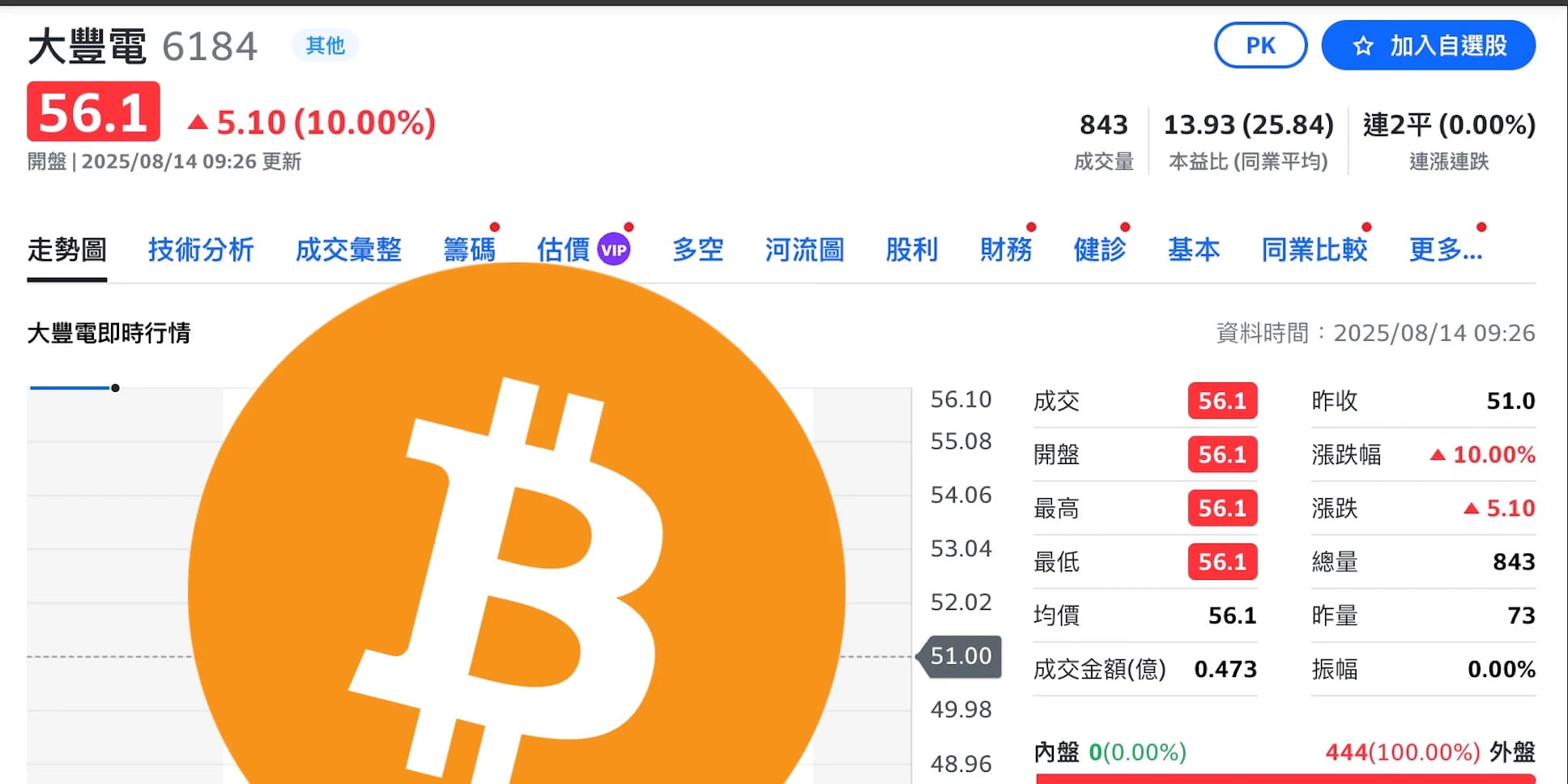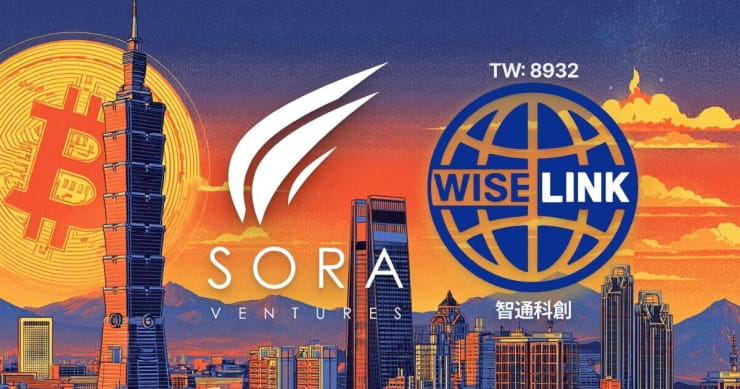In August 2025, a wave originating from the global cryptocurrency market is sweeping through the Asia-Pacific capital circle with unstoppable momentum. Following MicroStrategy in the U.S. and Metaplanet in Japan, the strategy of incorporating Bitcoin into long-term corporate balance sheets has finally made a significant impact on the capital market in Taiwan.
In just a few days, two listed companies in Taiwan—Dafeng Electric (6184) and Zhitong Kechuang (8932)—have bravely taken the first step to embrace Bitcoin via different paths. The market responded with great enthusiasm, and the stock prices of the relevant companies surged, sparking widespread discussion: Does this mean that the 'Bitcoinization' era of the Taiwanese capital market has arrived? Is a BTC hoarding wave led by listed companies about to sweep over the Taiwan stock market?
Taiwan's version of MicroStrategy

The historical first shot was fired by Taiwan's well-known cable television and broadband service provider—Dafeng Cable Television Co., Ltd. (referred to as Dafeng Electric, stock code: 6184). On the evening of August 13, Dafeng Electric's board passed a groundbreaking resolution: to officially establish a 'Digital Asset Committee' and include Bitcoin in the company's long-term reserve assets. This move makes it the first publicly listed company in Taiwan to announce the incorporation of digital currency into its long-term financial strategy.
Once the news broke, the capital market reacted swiftly. On August 14, as soon as the Taiwan stock market opened, Dafeng Electric's stock price was locked at a 10%涨停板 (daily limit up), reaching NT$56.1 per share, indicating a high level of recognition and expectation from investors regarding this decision.
It is worth noting that Dafeng Electric is not a poorly managed company seeking transformation. According to its latest financial report, the company's revenue for the first half of the year reached NT$1.078 billion, a year-on-year increase of 2.2%, setting a record high for the same period in history, indicating a solid fundamental condition. This suggests that incorporating Bitcoin into asset reserves is not a speculative move, but rather a forward-looking strategic layout made by a well-operating enterprise in response to the macro environment of global inflation and increasing uncertainty in traditional asset returns.
Dafeng Electric stated in a declaration that Bitcoin, with its fixed supply, decentralized structure, and high global liquidity, has been dubbed the new generation of 'digital gold'. In the ever-changing economic and financial environment, it can bring greater stability and flexibility to the company's capital. To ensure the robust execution of this strategy, the newly established 'Digital Asset Committee' will be chaired by director Dai Yonghui, with members covering core departments such as risk management, legal affairs, cybersecurity, and strategy. They will be responsible for formulating asset allocation principles, risk control mechanisms, and information disclosure standards, emphasizing that the investment amount will be completely separated from daily operating funds to ensure that core business operations are unaffected.
Dafeng Electric's move is widely viewed as the birth of the 'Taiwan version of MicroStrategy.' Its demonstration effect is extremely strong, providing a clear reference and immense imaginative space for other Taiwanese listed companies that are still observing.
Cross-Border Financial Chessboard

At the same time that Dafeng Electric ignited market discussions, another listed company in Taiwan—Zhitong Kechuang Co., Ltd. (stock code: 8932)—entered the Bitcoin reserve arena in a more complex and international manner.
On August 15, the company announced that Zhitong Kechuang's board officially launched the 'Bitcoin Capital Strategy + Cross-Border Finance' dual-engine model on August 8, making it the first listed company in Taiwan to adopt a Bitcoin capital investment strategy. Specifically, Zhitong Kechuang's layout is divided into two core areas:
Investing in SORA, connecting to the global Bitcoin reserve network: Zhitong Kechuang announced that it will subscribe to the three-year convertible corporate bonds issued by the globally Bitcoin reserve-focused investment company Top Win International Limited (stock code: SORA), listed on NASDAQ in the United States, with an amount of up to $2 million. SORA is a company headquartered in Hong Kong, having transformed from a traditional luxury watch business to a platform focused on holding Bitcoin and investing in other Bitcoin reserve-type enterprises, backed by the well-known crypto venture capital Sora Ventures. Through this investment, Zhitong Kechuang indirectly connects with SORA's Bitcoin reserve ecosystem globally, especially in Asia.
Acquiring an Indian financial license, expanding cross-border business: At the same time, Zhitong Kechuang announced the acquisition of 100% equity in Letul Investments Private Limited, located in New Delhi, which holds an NBFC (Non-Banking Financial Company) license in India, allowing it to legally engage in lending, payments, and digital financial services locally.
The combination of these two decisions clearly outlines Zhitong Kechuang's grand blueprint. It is not only about holding Bitcoin as a store of value but also integrating Bitcoin as a productive asset with its fintech operations in emerging markets like India. In the future, Zhitong Kechuang can explore launching innovative services like cross-border settlements, crypto asset mortgage loans, and Web3 payments, opening up a new revenue growth curve for the company.
This dual-engine model combining 'asset reserves' and 'business applications' has also received positive feedback from the market. Since the announcement, the stock price and trading volume of Zhitong Kechuang have significantly increased, showing that the market highly appreciates its complex and long-term strategic layout.
Is the hoarding wave here?

Dafeng Electric's direct reserves and Zhitong Kechuang's indirect investments and business integration represent two different paths for listed companies to embrace Bitcoin, but they both point to a clear trend: Bitcoin is gradually moving from a niche alternative asset into the balance sheets of traditional enterprises.
Will this wave evolve into a 'BTC hoarding wave' sweeping over the Taiwan stock market? It may be too early to draw conclusions, but several positive signals have already emerged:
Demonstration effect emerges: After both companies announced their related strategies, their stock prices received immediate positive feedback, which will greatly encourage other enterprises that are still observing.
Global trend resonance: From the U.S. government's establishment of a Bitcoin strategic reserve to over 167 listed companies globally incorporating Bitcoin as inventory assets, this has become an irreversible global trend. The participation of Taiwanese enterprises is an inevitable response to this trend.
The model is gradually clarifying: The success of Japan's Metaplanet provides a template for Asian enterprises to follow. By issuing bonds and stocks, among other methods, to continuously increase Bitcoin holdings without affecting the cash flow of their main business, and thereby enhancing company value and market attention, has become a validated feasible path.
Of course, challenges still exist, including the establishment of relevant accounting standards, clarification of tax regulations, and how to explain the high volatility of crypto assets to traditional investors. However, these two events in August 2025 have undoubtedly opened a new chapter in the diversification of asset allocation for the capital market in Taiwan. The seeds of Bitcoin have been sown, and the market is holding its breath to see if they will grow into a dense forest in this land.